
The World Council of Churches (WCC) is a worldwide Christian inter-church organization founded in 1948 to work for the cause of ecumenism. Its full members today include the Assyrian Church of the East, the Oriental Orthodox Churches, most jurisdictions of the Eastern Orthodox Church, the Union of Utrecht, the Lutheran World Federation, the Anglican Communion, the Mennonite churches, the World Methodist Council, the Baptist World Alliance, the World Communion of Reformed Churches, the Pentecostal churches, the Moravian Church and the Malankara Mar Thoma Syrian Church. Notably, the Catholic Church is not a full member, although it sends delegates to meetings who have observer status.
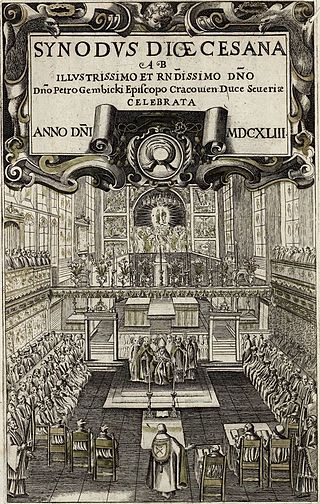
A synod is a council of a Christian denomination, usually convened to decide an issue of doctrine, administration or application. The word synod comes from the Ancient Greek σύνοδος 'assembly, meeting'; the term is analogous with the Latin word concilium'council'. Originally, synods were meetings of bishops, and the word is still used in that sense in Catholicism, Oriental Orthodoxy and Eastern Orthodoxy. In modern usage, the word often refers to the governing body of a particular church, whether its members are meeting or not. It is also sometimes used to refer to a church that is governed by a synod.

Ecumenism – also called interdenominationalism, or ecumenicalism – is the concept and principle that Christians who belong to different Christian denominations should work together to develop closer relationships among their churches and promote Christian unity. The adjective ecumenical is thus applied to any non-denominational initiative that encourages greater cooperation and union among Christian denominations and churches.
The International Prison Chaplains' Association (IPCA) is an association of prison chaplains. It is divided into several sections like IPCA-Europe, IPCA Oceania etc. It is a non-governmental organization and has held Special Consultative Status to the United Nations Economic and Social Council since 2014.
Alison Elliot CBE FRSE is an honorary fellow at New College, Edinburgh. She was the former Associate Director of the Centre for Theology and Public Issues at the University of Edinburgh, Scotland. In 2004 she became the first woman ever to be elected Moderator of the General Assembly of the Church of Scotland. An elder and session clerk at Greyfriars Kirk in Edinburgh, she was also the first non-minister to hold this post since George Buchanan in 1567.
The Conference of European Churches (CEC) was founded in 1959 to promote reconciliation, dialogue and friendship between the churches of Europe at a time of growing Cold War political tensions and divisions.
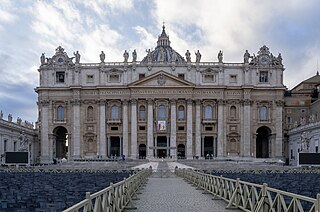
The Catholic Church in Europe is part of the worldwide Catholic Church in full communion with the Holy See in Rome, including represented Eastern Catholic missions. Demographically, Catholics are the largest religious group in Europe.

The Chapel of the Resurrection, or the Chapel for Europe, is a Roman Catholic church with an ecumenical vocation located in the heart of the Brussels' European Quarter, next to the former Convent Van Maerlant.
The Council of the Bishops' Conferences of Europe is a conference of the presidents of the 33 Roman Catholic episcopal conferences of Europe, the Archbishop of Luxembourg, the Archbishop of Monaco, Maronite Catholic Archeparch of Cyprus, the Roman Catholic Bishop of Chişinău, the Ruthenian Catholic Eparch of Mukacheve, and the Apostolic Administrator of Estonia.

The Eastern Orthodox Church has a presence in Germany. With up to 2 million adherents, the Church is Germany's third-largest Christian denomination after Roman Catholicism and the Evangelical Church in Germany (EKD). It has grown due to immigration from Eastern Europe, especially Romania, Greece, the former Soviet Union, and the former Yugoslavia.
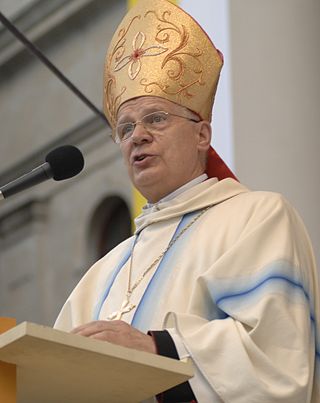
Józef Michalik is a Polish Roman Catholic bishop, the diocesan Bishop of the Zielona Góra-Gorzów diocese in 1986-1993, Archbishop of Przemyśl in 1993–2016, and the President of the Polish Episcopal Conference in 2004–2014.
Svetozar Saša Kovačević was a Serbian composer, music pedagogue and church organist. He was one of Serbia's best-known contemporary composers.
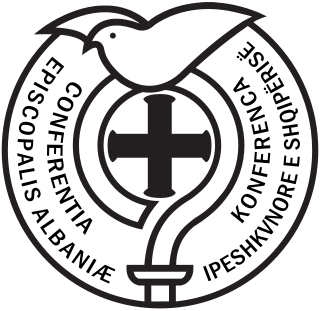
The Albanian Bishops' Conference (KISH) is an episcopal conference of the Catholic Church in Albania. The conference is organized by Archbishop Angelo Massafra, Archbishop and Metropolitan of Shkodrë-Pult conducted. It is a member of the Council of European Episcopal Conferences (CCEE).
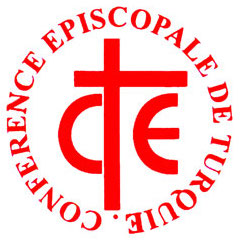
Episcopal Conference of Turkey is the committee meeting of the Catholic bishops in Turkey of the various ritual churches. It is a member of the Council of European Episcopal Conferences (CCEE), and a guest member of the Southeast European Bishops' Conferences.

The Romanian Episcopal Conference is the permanent assembly of Catholic bishops in Romania. The bishops' conference has its headquarters in Bucharest, is a member of the Council of European Episcopal Conferences (CCEE) and sends a representative to the Commission of the Bishops' Conferences of the European Community (COMECE).

The Austrian Bishops' Conference is the official assembly of the Roman Catholic bishops of Austria. It is the supreme authority of the Roman Catholic Church in Austria, established as a formal body under public law in 1849. Its members include the archbishops of Vienna and Salzburg, all diocesan and auxiliary bishops, as well as the abbot of immediate Wettingen-Mehrerau Abbey.

The Bishops' Conference of Bosnia and Herzegovina is the permanent assembly of Catholic bishops in Bosnia and Herzegovina founded in 1994 by the Holy See.
Matthew Ross is a minister of the Church of Scotland, working for the World Council of Churches. He was General Secretary of Action of Churches Together in Scotland 2014-2018.
Antonios Varthalitis, AA was from 1962 to 2003 Catholic Archbishop of the Roman Catholic Archdiocese of Corfu, Zakynthos and Cephalonia.
Dietmar Werner Winkler is an Austrian scholar of patristics and ecclesiastical history. He is a professor and the founding director of the Center for the Study of the Christian East at the University of Salzburg.











